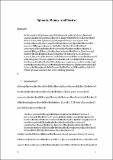Spinoza, money, and desire
Abstract
In the context of Spinoza's psychological and political theory, money appears as a profound social problem. I agree with Frédéric Lordon and André Orléan that Spinoza's psychological theory can explain how multiple agents can converge on a single monetary good as a means of payment. I disagree, however, with their further claim that this convergence brings an end to rivalrous conflict among those agents. Instead, I argue, it intensifies and concentrates this rivalry, threatening the very bonds that hold society together. Yet money is, on Spinoza's account, necessary for commerce, and commerce is necessary for humans to live together. The social problem that thus arises is that of ensuring that money can play its vital role in supporting commerce without giving way to destructive rivalries that can destroy society. My interpretation of Spinoza on these points is influenced by the theory of René Girard, with which Spinoza's account has some striking parallels.
Citation
Douglas , A 2018 , ' Spinoza, money, and desire ' , European Journal of Philosophy , vol. Early View . https://doi.org/10.1111/ejop.12346
Publication
European Journal of Philosophy
Status
Peer reviewed
ISSN
0966-8373Type
Journal article
Collections
Items in the St Andrews Research Repository are protected by copyright, with all rights reserved, unless otherwise indicated.

